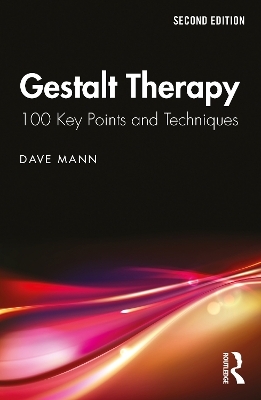
Gestalt Therapy
Routledge (Verlag)
978-1-138-06772-1 (ISBN)
The theoretical assumptions underpinning gestalt therapy.
Gestalt assessment and process diagnosis.
Field theory, phenomenology and dialogue.
Ethics and values.
Evaluation and research.
As such this book will be essential reading for gestalt trainees, as well as all counsellors and psychotherapists wanting to learn more about the gestalt approach.
Dave Mann is a UKCP Registered Gestalt Psychotherapist, Supervisor and Trainer affiliated with the Metanoia Institute, Gestalt Psychotherapy Training Institute and Sherwood Psychotherapy Training Institute. He is also a former Assistant Editor of the British Gestalt Journal.
Part 1: Maps for a Gestalt Therapy Journey – Laying the Ground, Theoretical Assumptions; 1. Gestalt Therapy: A Very Brief History; 2. So, what is Gestalt?; 3. And what is a Gestalt?; 4. Gestalt Psychology’s Laws of Perception; 5. Figure and Ground; 6. Awareness and The Awareness Continuum; 7. Contact; 8. The Here and Now; 9. Creative Adjustment; 10. Self and Selfing; 11. Structures of The Self: Id, Ego and Personality Functions; 12. Holism; 13. Individualism and Field Paradigms; 14. The Contact Boundary; 15. The Gestalt Cycle of Experience; 16. Resistances, Interruptions, Moderations to Contact; 17. The process of Introjection; 18. Ground Introjects; 19. Retroflection; 20. Projection; 21. Confluence; 22. Deflection; 23. Desensitisation; 24. Egotism/Self-Monitoring; 25. Continuums of Contact; 26. Creative Indifference; 27. Unfinished Business: The Zeigarnik Effect; 28. The Paradoxical Theory of Change; 29. The Aesthetics of Gestalt Therapy; 30. Support as ‘That Which Enables’; Part 2: Beginning the Therapy Journey – Preparations and Initial Assessment; 31. The Therapy Setting; 32. Contracts and Expectations; 33. Contact Functions – Making and Breaking Contact; 34. Assessment and Process Diagnosis; 35. How the Client "Bodies Forth"; 36. Zones of Awareness; 37. Emerging Relational Themes; 38. Planning the Journey; 39. Assessing Suicidal Risk; Part 3 The Therapy Journey – The Three Pillars of Gestalt; 3.1 Exploring the client’s situation or field; 40. Situation, Field, Life-space, Life-world; 41. Co-creation and Temporality; 42. The Therapy Space as Present Situation; 43. The Field Organises the Need and the Need Organises the Field; 44. The Id of the Situation; 45. Support in a Relational Field; 46. Shame as a Function of the Field; 47. Sensing into the Field; 48. Viewing the Field through a Developmental Lens; 49. Development – A Lifelong Process; 50. Developmental Theory – Six Fundamental Movements; 51. The Cultural Field; 52. Five Explorations; 53. Language and Metaphor; 54. Attending to the Wider Field; 3.2 Focus on Experience: Phenomenology in Gestalt Therapy; 55. What is Phenomenology?; 56. Phenomenological Enquiry; 57. Intentionality: Reaching Out to my World; 58. Transcendental Phenomenology and Husserl; 59. The Discipline of Phenomenological Reduction; 60. Existential Phenomenology; 61. Intersubjectivity; 62. Attending to the Bodily ‘Felt Sense’; 63. Energy and Vitality; 64. The Lived Body; 65. Perceiving the Whole; 66. Liminal Space; 3.3 Dialogue – Emerging through Relationship; 67. What is Dialogue?; 68. I-Thou and I-It Relating; 69. The Between; 70. Inclusion and Empathy; 71. Presence; 72. Confirmation; 73. Commitment to Dialogue; 74. Attunement; 75. Enduring Relational Themes; 76. Self-Disclosure; 77. The Relational Turn; 78. Rupture and Repair; 79. Living the Relationship; Part 4: Becoming – Transitions along the Journey; 80. Gestalt Experimentation; 81. Experimentation and Challenge; 82. Experimental Methods; 83. Polarities and the Top Dog/Under Dog; 84. Two Chairs and the Empty Chair; 85. Homework and Practicing; 86. Dreamwork; 87. Catharsis and Release; 88. Aggressing on the Environment; 89. Working with Trauma; 90. Phases in Therapy and Endings; 91. Developing Awareness of Awareness; Part 5: Ethics and Values: Key Signposts for All Journeys; 92. Therapeutic Boundaries; 93. Relational Ethics; 94. Therapeutic Use of Touch; 95. Non-Exploitation; 96. Therapist Support; 97. Gestalt Supervision; Part 6: Evaluating the Approach: Destination and Looking Back; 98. Gestalt Applications beyond 1:1 and Group therapy; 99. Looking Back and Reviewing; 100. On Uncertainty and Certainty
| Erscheinungsdatum | 30.09.2020 |
|---|---|
| Reihe/Serie | 100 Key Points |
| Zusatzinfo | 3 Tables, black and white; 9 Line drawings, black and white; 1 Halftones, black and white; 10 Illustrations, black and white |
| Verlagsort | London |
| Sprache | englisch |
| Maße | 129 x 198 mm |
| Gewicht | 380 g |
| Themenwelt | Medizin / Pharmazie ► Medizinische Fachgebiete ► Psychiatrie / Psychotherapie |
| Sozialwissenschaften ► Soziologie | |
| ISBN-10 | 1-138-06772-5 / 1138067725 |
| ISBN-13 | 978-1-138-06772-1 / 9781138067721 |
| Zustand | Neuware |
| Haben Sie eine Frage zum Produkt? |
aus dem Bereich


